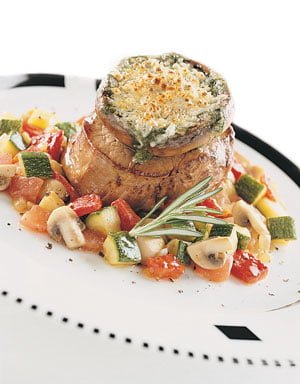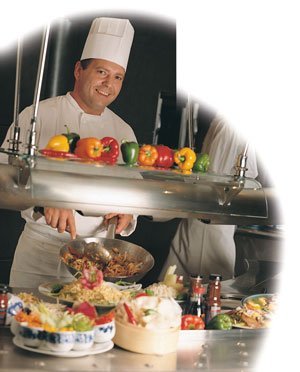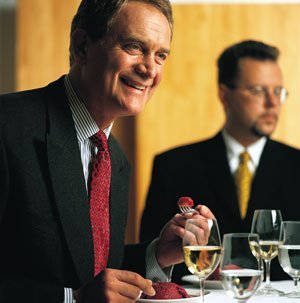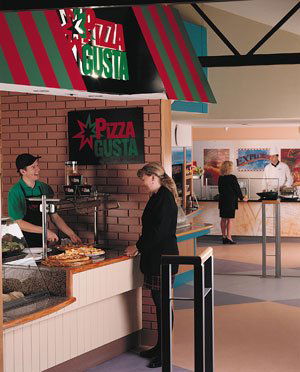
Today we live in a highly competitive world in which only one thing is certain for companies – change. Intelligent companies continually seek to adapt in order to seize new opportunities that arise. Entrepreneurial organisations transform themselves, this is known as re-invention.
An entrepreneurial organisation looks for opportunities to use all resources more effectively. An organisation with an entrepreneurial culture will actively seek change and be quick to respond. It will be ‘market-led’ and prepared to take risks. For this to be possible, the organisation must have a flexible structure that enables re-invention.
This case study examines how, in the late 1990s, Gardner Merchant re-invented itself from a position of contract caterer in business and industry to become a true multi-service provider, capable of satisfying outsourcing requirements for a wide range of people-based services.
Gardner Merchant is a member of Sodexho Alliance. Sodexho is the largest food and management services company in the world, with a global turnover of £6.3 billion Euros, operations in 66 countries, 250,000 employees and 18,700 operating units. Gardner Merchant is the UK operation of Sodexho and focuses on local delivery of service on a site by site basis, with 50,000 permanent staff at 3,500 client locations providing catering and support services.
The 1990s saw the transformation of most large companies in the United Kingdom. Previously, companies grew very large, employing great numbers of people and managing services such as security, building facilities, public relations, and transport.
Following a turnaround in business thinking, organisations started to downsize, to strip out non-core activities and concentrate on their strongest assets. Large companies began to outsource many of their non-core activities – they used outside contractors to provide them with goods and services which were not part of their core business. This created a tremendous opportunity for companies to concentrate on meeting the requirements of large companies for specialist services.
Reasons for a new strategy

Gardner Merchant specialises in the outsourcing of services and is able to call on the global resource of Sodexho. Gardner Merchant is absolutely focused on delivering service locally to meet individual client needs.
Gardner Merchant is typical of the modern entrepreneurial company that is taking up new opportunities. It leads in food service provision and recent research has shown that over 80 per cent of respondents recognise Gardner Merchant as a contract caterer in business and industry. Although Gardner Merchant’s ‘core’ activity has traditionally been in food service provision, it is now accelerating its involvement in providing a range of non food services.
This new market is valued at over 2.5 times the food service market (approximately £17.5 billion). Gardner Merchant is now re-positioning itself as a true multi-service provider, capable of satisfying the outsourcing requirements of a wide range of people based services.
Gardner Merchant’s strength is taking responsibility for its clients’ non-core functions. For example, Gardner Merchant is already the leader in the NHS market with more than 130 hospital sites. Its principal hospital services cover housekeeping, catering for patients, staff and visitors, vending, portering and non-emergency patient transport.
However, Gardner Merchant Healthcare is extending its range of support services to hospitals by providing round the clock switchboard services, car parking, security, laundry and grounds maintenance. These fully integrated facilities management contracts mean that the hospitals can focus on the clinical aspects of patient care, while Gardner Merchant delivers its catering and other non-clinical support services efficiently and cost effectively.
Meeting business objectives

An organisation that outsources business activities must be confident that its contractors will help the organisation to meet its business objectives. While a university or school concentrates on educational objectives it will also want to be assured that students are happy about all other aspects of their daily lives – that they are being fed well or that their leisure requirements are being met.
Gardner Merchant therefore invests considerable time in making sure its partnership supports the client’s core activity and ensures that support services run smoothly. Research plays an important part in Gardner Merchant’s planning especially in the area of food services where the need is to ensure the right food is provided at the right price and in the right environment.
In the education sector for example, every two years the Gardner Merchant School Meals Survey researches children’s and their parents’ lifestyles, values and perceptions. This enables the company to align its services to satisfy the needs of parents, head, teachers, governors and pupils.
A similar approach is taken in higher education where focus groups and attitude surveys are used to establish the food tastes and preferences of consumers at every campus Gardner Merchant operates.
Customising services

An organisation like Gardner Merchant must customise its services to serve the needs of customers. Its philosophy in business is to understand clearly the goals of every client and then to channel resources and expertise into a tailor-made service that meets the culture and the evolving needs of the organisation.
The relationship is one of partnership with everyone pulling in the same direction. Gardner Merchant agrees clear criteria for measuring performance and success to ensure the client is content with the partnership.
In industry, Gardner Merchant has customised its partnership with clients based around four distinct service offers:
- ‘Citation’ is recognised as the benchmark in corporate restaurants and hospitality
- ‘Ethos’ is the optimum combination of food, quality and cost control
- ‘Portfolio’ is an individually-tailored catering and support service
- ‘Directors’ Table’ serves the boardrooms and staff restaurants of many City and central London institutions and ‘blue chip’ companies.
Re-inventing Gardner Merchant

Gardner Merchant is building on its core competence of providing quality outsourced services to business, initially developed in the field of food services. By sticking purely to catering, it would have limited its markets and growth opportunities.
Over recent years it is the evolution into the full range of integrated support services that has most changed the face of Gardner Merchant. It has become one of the leaders in providing people-based support services. By listening to customers and anticipating business trends, the company has become a multi-service provider, a one-stop shop for its clients’ support service requirements. These include reception/concierge/switchboard, cleaning, porterage, mail room, reprographics and grounds maintenance services that are all delivered directly using the company’s own staff.
The expansion programme has followed a well-established strategy of forming niche businesses with specialist management teams. Through its Primary Management Defence Services business, for example, the company is leading the consortium responsible for one of the most complex outsourced contracts in the UK: to provide 42 separate support services at Aldershot Garrison, the ‘home’ of the British Army. The contract has clear parallels for the commercial market, where there are significant advantages to be gained from tightly-managed integrated service delivery.
Safegard is the country’s leading environmental health and safety consultancy. Healthworks designs and manages health, fitness and leisure facilities in the workplace. Keyline specialises in business travel services. Lockhart is the largest catering equipment supplier in the UK as well as being a leader in the design and installation of kitchens, completing one project every working day. One recent project was a kitchen installation for the new Pavilion at Lord’s – in time for the 1999 World Cup. Kelvin recently announced its merger with Universal Services to form the largest offshore catering and facilities management contractor in the continental European market.
The range of client requirements that Gardner Merchant meets is very wide indeed. At one level, it involves the major logistics skills needed to provide a full meals service for 30,000 people at Silverstone for the British Grand Prix. It also means applying the same meticulous care and attention to detail for a small industrial cafeteria operation in Strathclyde, a nursing home in Southampton or a school in Sheffield.
Three out of every four FTSE 100 companies have appointed Gardner Merchant to provide cost-effective solutions to their employee or hospitality catering and support services. Some of these relationships have existed for 40 years or more.
Conclusion

The organisation that seeks to re-invent itself regularly looks forward to the future rather than back into the past. During April and May 1999 Gardner Merchant ran a multi-media Vision 21 Millennium Roadshow inviting thousands of guests and staff to challenge themselves and their perceptions of the future at a series of roadshows across the country.
In all, there were 250 employees staffing 73 stands – a reflection of the enormous diversity within the company. The aim of the roadshows was to open the debate on what those new challenges will be. By inviting clients, staff and partner suppliers to consider the issues they each face, Gardner Merchant would be in a far better position to adapt its services to help its partners achieve their future goals.
One step towards embracing the future modelled in Vision 21 was the importance of further strengthening a culture of creativity and innovation. The roadshows’ Innovations Forum presented 25 of the best practical ideas from around the entire UK. Judging was based on how closely the service mirrored the consumers’ needs.
Constant innovation will not only secure competitive advantage, but will provide the opportunity to answer client needs – sometimes before the questions have even been raised. In the near future Gardner Merchant will continue to change shape – building new operations and perhaps even discarding some as a result of changing client and consumer requirements and changes in the business environment.
In the longer term it is impossible to predict how Gardner Merchant will re-invent itself, although extensive change is sure to take place. As a flexible organisation, change will be welcomed rather than feared.
